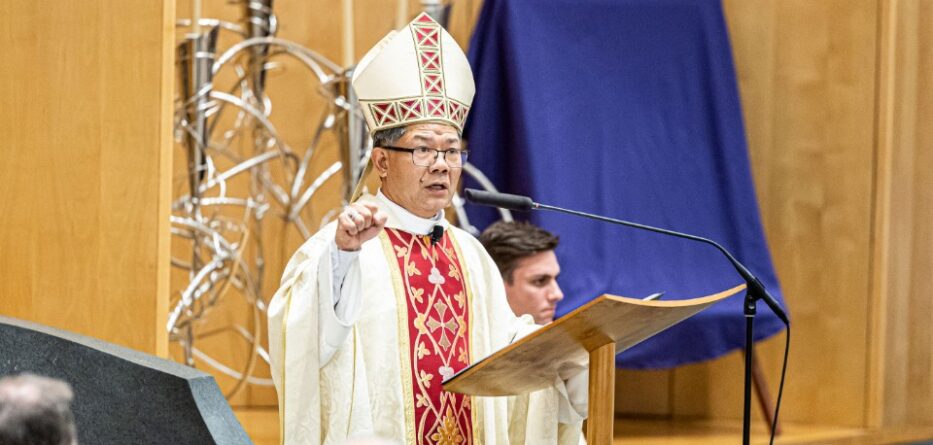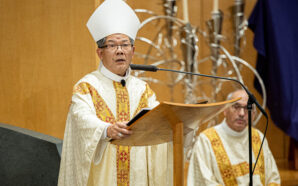Most Reverend Vincent Long Van Nguyen OFM Conv DD STL, Bishop of Parramatta
Homily for the Chrism Mass 2023 at St Patrick’s Cathedral, Parramatta.
Readings: Isaiah 61:1-9; Apocalypse 1:5-8; Luke 4:16-21
5 April 2023
Becoming the Church that ministers to the wounded Christ
It is with great joy, hope and confidence that we have gathered at our mother Church to renew our commitment to be the wounded healers in the footsteps of our Lord. Despite the many challenges facing us on all sides, we must not lose sight of our mission to embody the compassionate God for the world. As Pope Francis reminds us that what the Church needs most today is to heal wounds, to warm hearts and to offer closeness to those who suffer. Hence, this Chrism Mass epitomizes who we are as the living Body of Christ and his continued presence. We exist not primarily to impose our values on the world or to get our hands on the levers of temporal power but to bind its wounds. We embody the wounded Lord and minister to his wounds in the poor, the sick, the captive, the socially stigmatized, rejected and marginalised. The Church without wounds and Christian faith without wounds are not compatible with the Gospel.
The Word of God this evening speaks of a God who stands on the side of wounded humanity. It is a God whose existence is not called into question by the world’s suffering, but who feels that pain alongside us. In Jesus the Anointed One, God embraces, heals, restores, dignifies and honours the downtrodden. In him, we are called to be an ecclesial community that is the sacrament of God’s compassion and care for the least and the last.
In the first reading, Isaiah reminds his people in exile that the promise of restoration was being fulfilled despite appearances to the contrary. He made known God’s intent to rehabilitate the life of the dispossessed out of impoverishment, powerlessness and despair. The Anointed of God would bring honour to his dishonoured people; a garland instead of ashes and oil of gladness instead of mourning. He would heal the broken-hearted, comfort the sorowful and free the captives. This messianic project, however, is not a repetition of the broken old system or a restoration of the Jewish monarchy with its golden temple in Jerusalem. For the era of political dominance, power and glory also happened to be the time of social division and corruption. Rather, the Messiah will usher in a new Kairos where Israel will live out the fundamentals of the covenant and to shine out as a beacon of hope for the nations.
That is a sobering and poignant lesson for the Church today. We too enter a Kairos, a privileged time to rebuild not so much into a dominant institution reminiscent of some bygone era. Rather, our task during this time of cleansing and purification is to become what we are meant to be: salt of the earth and light of the world. During the time of the Roman persecution, the Church gathered in places like the catacombs. It was poor, persecuted and few in numbers. Yet it was a powerhouse of prayer, love and solidarity. Today, in the midst of diminishment, we can learn to spread the fragrance of the Gospel and to shine like the Church of the catacombs.
In the Gospel, Jesus takes up the message of Isaiah and turns it into a kind of personal manifesto. The blind see, the deaf hear, the lame walk, the dead raised and Good News preached to the poor constitute the signs of God’s reign. Wherever Jesus goes, people experience its in-breaking power through his person, teachings and actions. He fulfils the messianic prophecy of old and makes present the divine intent of redemption and reconciliation.
The challenge for us today is to be the Church on mission for those who long for healing, affirmation, encouragement, justice and love. We cannot be an inward looking group but a missionary and prophetic community of disciples. We cannot be that community without engaging with those on the margins of life.
Dear brothers and sisters,
On this day of renewal of our commitment to serve, particularly as ordained ministers, let us respond generously to touch the places of pain in the world. Let us use the sacred oils consecrated in this Chrism Mass with touches of gentleness and healing wherever we encounter suffering. Our ministry as wounded healers can only be authentic when we immerse ourselves in the liminal places of pain, ambiguity, struggle and despair. Indeed, our shared suffering with others is the precondition for the preaching of the Good News. For that was the way of Jesus.
We are about to embark on the diocesan journey of synodality, which I believe will be the source of renewal for us moving forward. Pope Francis has said that this wholesome way of being Church, namely greater communion, participation and mission, is what God expects of us in the third millennium. Synodality is therefore a platform for agency and creativity that enables all members of the Church to be protagonists and agents of evangelization. I urge you to give the Diocesan Synod your wholehearted response: every person, parish, school, agency, deanery and other entity. Let us plough the fields for the seeds of the synodal Church to grow and bear fruit. Let us pray that we may grow through chaos and uncertainty in order to be more aligned with God’s purpose. May we become God’s priestly and holy people, anointed to serve and with the one who is the Alpha and Omega. May we learn to be once again the Church that accompanies people on the peripheries of life.
Read about the 2023 Chrism Mass here.








